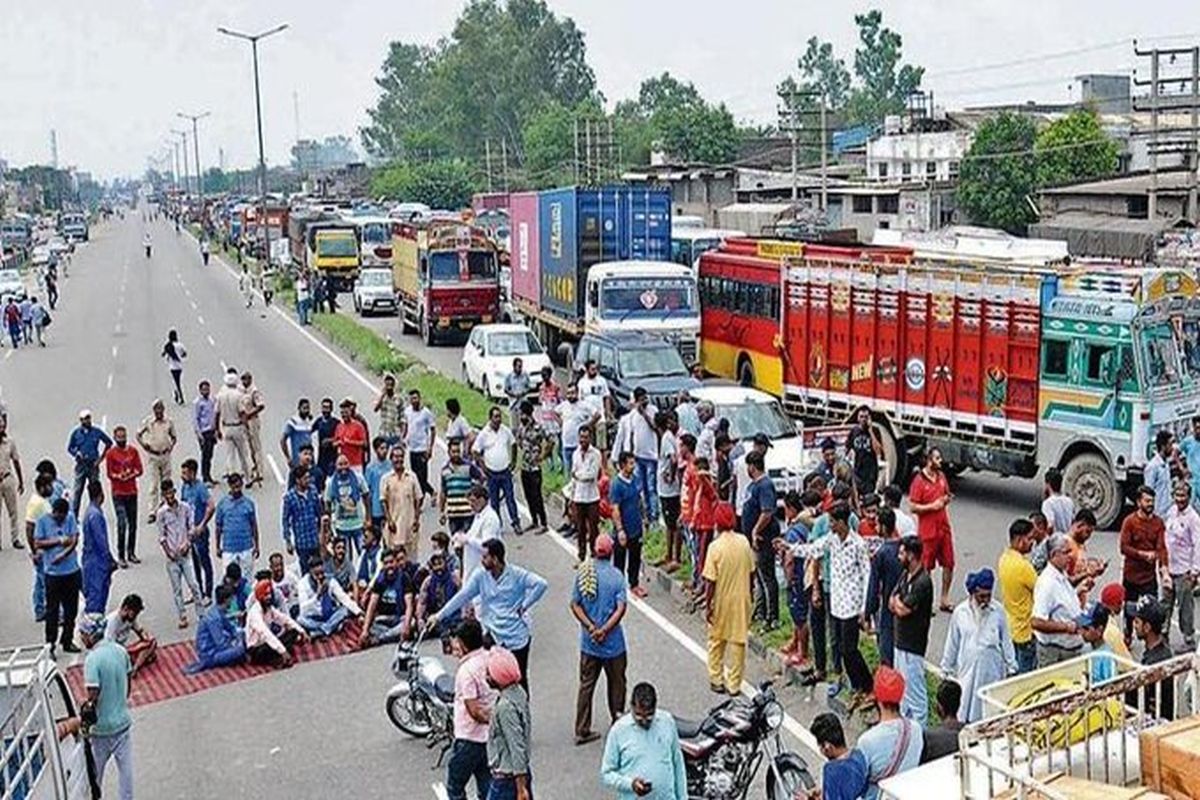With Mayawati’s BSP in decline, a tussle has broken out between Arvind Kejriwal’s Aam Aadmi Party and firebrand Dalit leader from UP Chandrashekhar Azad for the Dalit vote in Delhi. Assembly elections in the Capital city are due next February and Dalits with a population of 25 lakh are a key voter bloc. The tussle burst into the open last week during a protest march against the demolition of a temple in Delhi’s Tughlaqabad dedicated to mystic saint Ravidass who is venerated by Valmiki Dalits.
The protest was organized by Azad’s Bhim Army which is clearly seeking to spread its wings beyond the Dalit leader’s home state of UP. At some point, AAP social justice minister Rajendra Pal Gautam tried to muscle his way on to the stage at Ramlila Maidan where the protestors had gathered in huge numbers. Annoyed by the intrusion, Azad ordered the protestors to leave the grounds and march to Tughlaqabad to the site of the demolished temple. Within minutes, the maidan emptied out, leaving Gautam standing alone on the stage. The protestors had chosen their leader.
Advertisement
After 2007, when Mayawati first became chief minister of UP on her own steam, Dalits in Delhi had switched their loyalties to the BSP. But Mayawati’s consecutive electoral defeats left them disillusioned and they have been looking for another leader. In the 2015 assembly election, they experimented with Kejriwal. But as events at Ramlila Maidan showed, Delhi’s Dalits are willing to try a new face. The Azad-Kejriwal tussle is likely to intensify as the February polls approach.
Defections fuel anger
The BJP’s political ambitions in Sikkim have run into rough weather following street protests against the mass exodus of Sikkim Democratic Front MLAs to the saffron party recently. Ten of the SDF’s 13 MLAs joined the BJP to help the lotus bloom in a state where the party had no presence earlier. Overnight, the BJP became the main opposition party in Sikkim although it had won less than 2 per cent of the votes in the recent Lok Sabha polls.
Protestors took to the streets waving placards asking the defectors to resign. According to reports from the state, anxiety and worry have been mounting in Sikkim after the Modi government scrapped Article 370 and Article 35 A and bifurcated Jammu and Kashmir into two union territories. Like J&K, Sikkim too has special status under Article 371 F which prohibits outsiders from buying land in the state.
It seems people in Sikkim are worried that they may lose this protection with the rise of the BJP in this tiny Himalayan region. The protests were organized by the Sikkim Progressive Youth Forum but NGOs and citizens groups joined in large numbers. The BJP will have to work hard to assuage the people’s concerns for the party to take root in the state.
Contrasting positions
The home ministry and the external affairs ministry seem to have taken different positions with Bangladesh on the contentious issue of illegal Bangladeshi migrants in India. While home minister Amit Shah was tough on his visiting counterpart from Bangladesh a couple of weeks ago, foreign minister S Jaishankar was more reassuring.
He owned up to the issue being an internal affair of India. Jaishankar was answering queries from the Bangladesh media at an impromptu press conference with his counterpart in Dhaka at the end of his recent visit. The first question to him from a Bangladeshi correspondent was about the drive to identify illegal migrants through the NRC project in Assam. He was asked what India proposes to do.
Jaishankar replied that it is an internal matter. The subtext was that Bangladesh need not worry that India may push these migrants back into that country. Shah, on the other hand, has been declaring repeatedly that he will not allow a single illegal migrant to remain in India. While the government seems to be speaking in different voices on this tricky issue, Jaishankar’s reassuring message to Dhaka bore immediate fruit. The very next day, Bangladesh came out with a statement in support of the Modi government’s decision to scrap Article 370 and bifurcate the state of Jammu and Kashmir. It’s an internal matter of India, the Bangladesh foreign office said.
A truce with Modi?
Political circles are buzzing about Delhi chief minister Arvind Kejriwal’s self-declared truce with Narendra Modi and the BJP government at the centre. After Modi’s overwhelming comeback for a second term, Kejriwal has completely stopped criticizing the PM and making the kind of personal attacks he had become notorious for. In fact, just the other day, he went as far as expressing confidence in Modi’s ability to turn around the economy.
Apparently, Kejriwal did a quick survey in Delhi which is said to have revealed that people are in the same frame of mind today as they were five years ago in 2014 when the BJP swept all seven Lok Sabha seats in the city. At that time, the refrain in Delhi was: Modi at the centre but Kejriwal in the state. AAP’s surveys say not much has changed in the five years. But there is a caveat to the findings. Delhi will give Kejriwal a second term only if he stops fighting with Modi.
The AAP chief seems to have taken the finding to heart, which is why he has gone soft on Modi and even supported the central government on the revocation of Article 370 in J&K.









